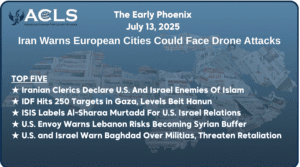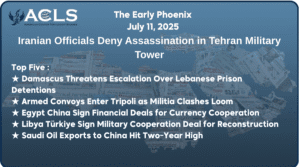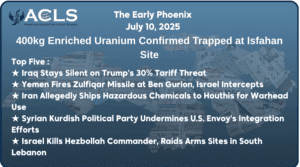Iran’s Dominance: Funding Hezbollah, Summoning Assad, and Forcing Iraq’s Hand
By: Rania Kisar
=======================
★ LEBANON

Iranian FM’s Visit: Boosting Hezbollah with Financial Aid via Tehran Flights
During a period of Israeli strikes that exceeded the usual skirmishes in Lebanon and Syria, the Foreign Minister of Iran’s visit was a necessary and calculated strategy to solidify Hezbollah’s position in confronting Israel. While it is true that Iran is seeking to craft the image of a regional power against the United States, by conducting a counter-move to Blinken’s visit to Israel, the reality is that despite regular communications between Nasrallah and Tehran, the visit was to facilitate crucial financial aid to Hezbollah, vital for its operations.
In an interview with Al Hadath, Camelia Entekhabi-Fard of Independent Persian discussed the Iranian Foreign Minister’s visit to Lebanon, emphasizing its goal to provide Hezbollah with crucial financial support for its operations, facilitated by direct flights from Tehran. She outlined the strong ties between Iran and its proxies like Hezbollah, which conduct operations and intelligence activities under Tehran’s direction, reflecting Iran’s strategic reach.
Entekhabi-Fard also touched on the complex Iran-U.S. dynamics, noting indirect communications aimed at avoiding conflict, including a U.S. advance notice to Iran before a strike, indicate a shared interest. Critically, she assessed the Biden administration’s foreign policy as potentially encouraging Iran’s bold regional actions, with implications for regional stability and the Iranian people.
Upon his arrival, the Iranian Foreign Minister issued a stark warning to Netanyahu, stating that any significant escalation in Lebanon would be Netanyahu’s “last day” and clearly declared, “Lebanon’s security is interconnected with Iran’s security.” In discussions with key figures from Lebanon’s political and militant landscape, including the Lebanese Amal Movement’s leader Nabih Berri, Hezbollah’s Hassan Nasrallah, and heads of Hamas and Islamic Jihad in Lebanon, as well as Najib Mikati of the Lebanese interim government, Abdullahian emphasized Hezbollah’s crucial role in deterrence, asserting, “Hezbollah in Lebanon has played its deterrent and influential role.” He confirmed the unified stance of Iran and Lebanon against escalating the conflict.
Iran’s FM Abdollahian disclosed recent US-Iran communications regarding Hezbollah’s involvement in the Israel conflict. Washington urged Tehran to restrain Hezbollah’s engagement, indicating a preference for a political resolution in Gaza. He also discussed Iran-Saudi talks to end the Gaza conflict, expressing Tehran’s support for peace in Gaza and the West Bank. He linked Red Sea navigational safety to stopping Gaza’s hostilities, stressing, “Iran and Lebanon agree that war isn’t the answer and that there was never an intention to widen the conflict.”
Amir Abdollahian’s advocacy for the Lebanese parliament’s role in electing the president subtly underscores Iran’s influential reach in Lebanon’s political arena. By promoting a process that ostensibly seeks consensus among Lebanon’s diverse political blocs without external interference, he not only champions the facade of Lebanese autonomy but also tacitly affirms Hezbollah’s dominant position in Lebanese politics—a testament to Iran’s overarching hegemony. This maneuver, while framed as support for self-determination, in effect, highlights Hezbollah’s considerable sway within the parliament, reflecting Iran’s strategic interests and its profound imprint on Lebanon’s political landscape.
=======================
★ SYRIA
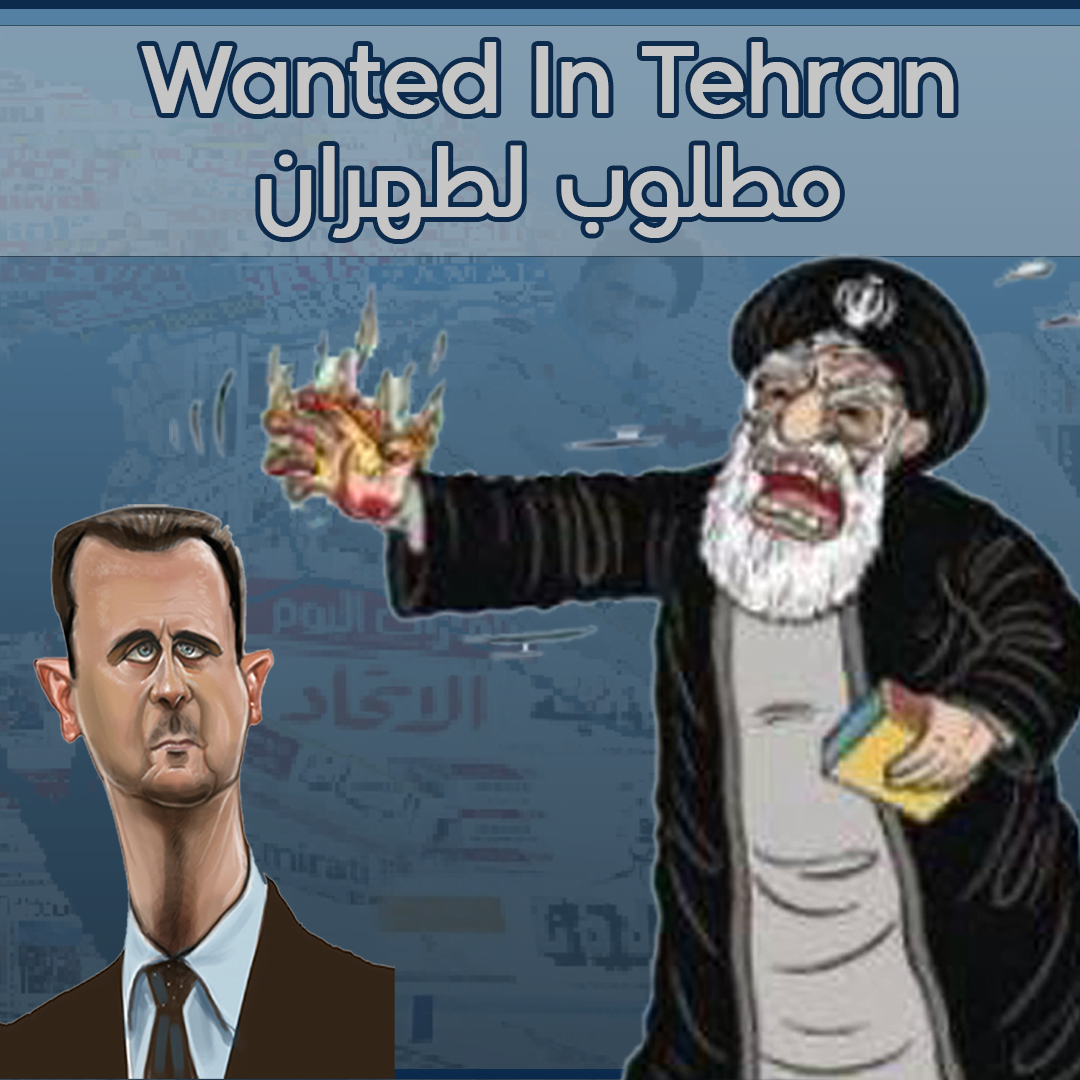
Iran Summons Assad: Loyalty Concerns and Alleged Israel Collusion
Israeli airstrikes hailed the visit of Iran’s Foreign Minister ahead of his arrival to Syria. These strikes hit the Damascus countryside and regions close to the Syrian-Lebanese border, particularly affecting the Sayyida Zainab area and Yafour, resulting in casualties among Iranian affiliates and significant Syrian figures. A notable target was Damascus’s Mezzeh military airport, coinciding with an Iranian cargo plane’s transit from Deir ez-Zor to Mezzeh.
Syrian state media reported the downing of two drones entering from the Golan Heights near Damascus.
During his visit to Damascus, Iranian Foreign Minister Abdullahian extended an invitation order to Bashar Assad to meet with Iranian President Raisi. Syrian opposition analysts inferred this invitation for several reasons.
The backdrop of these events includes increased activities by Iranian militias in Syria, notably transferring arms to Hezbollah areas near the Syrian-Lebanese border. This reflects a strategic buildup potentially anticipating escalated conflicts, within the broader scheme of Iran’s involvement in Syria, including militia support and exploiting Deir ez-Zor’s economic conditions to facilitate a drug trade exploiting vulnerable populations, including children.
Following the October 7 assault led by Iranian-backed Hamas, Israeli airstrikes have targeted Syria, aiming to disrupt Iran’s supply routes to Hezbollah and Hamas. Since January 30th, the focus has shifted towards eliminating key undisclosed figures. In late January, an airstrike in Damascus’s Mezzeh neighborhood killed 13, including five Iranian Revolutionary Guard advisers. Subsequent strikes in Homs province and the Damascus suburb of Sayyida Zainab resulted in 11 and 8 deaths, respectively.
Syria TV, an outlet aligned with the Syrian opposition, offered a detailed analysis on the motivations behind the Iranian Foreign Minister’s visit to Damascus. Labeling him as the “High Commissioner” within the Iranian alliance, the report contrasts this visit with U.S. Secretary of State Blinken’s recent trip to Israel, suggesting it serves to counteract U.S. influence in the Middle East.
The report further delves into the directive issued to Bashar Al-Assad, compelling him to visit Tehran. This summons, according to the Syrian opposition, stems from Iran’s concerns over Assad’s waning allegiance amidst apprehensions regarding Iran’s declining regional power. Additionally, a significant trigger for Assad’s required presence in Tehran is a Reuters report alleging collaboration between key figures in the Assad regime and Israel, specifically in relaying intelligence on the locations of high-ranking Iranian officers. The Assad regime media has yet to comment on the Iranian summon.
=======================
★ IRAQ
Iraq Capitulates to Iran’s Pressure While Facing Internal Divides and Economic Endeavors
US-Iran Tensions Escalate in Iraq Following Drone Strike and Militia Threats.
Following the assassination of Wisam Mohammed Saber al-Saedi, also known as Abu Baqer, by a US drone strike in Baghdad, Iran-supported militias in Iraq have signaled plans to renew hostilities against US forces. Additionally, a group known as the “Islamic Resistance in Iraq” declared its intention to target Israeli locations along the Dead Sea coast, attributing this action to Israel’s military operations in Gaza.
The Iraqi leadership has actively pursued peace, contributing to a period of reduced conflict despite US surveillance flights exacerbating tensions. These developments underline efforts by both Iraqi officials and the US to promote moderation, although the persistence of US military activities signals ongoing security challenges.
Iraqi Prime Minister Muhammad Shia al-Sudani, emphasizing Iran’s directive, has declared support from various factions, including Kurdistan, for the expulsion of American forces. Concurrently, the Iraqi Parliament is preparing to discuss the U.S. strike in Baghdad and draft legislation to terminate the international coalition’s presence, reflecting a concerted effort to assert sovereignty and enhance security. President Abdul Latif has called for a reassessment of Baghdad-Washington relations, advocating for transparency and unity in decision-making to preserve Iraqi sovereignty, despite the absence of Shiite representatives.
Security expert Parvez Rahim, along with other experts, warns that the expulsion of U.S. forces from Iraq, a move influenced by Tehran, could severely undermine Iraq’s economic stability and its capacity to independently counter terrorism. This action risks transforming Iraq into a militia-dominated state, amidst significant regional tensions.
Iraq Probes Insider Leaks After Precise US Drone Strikes on Militia Leaders.
Iraqi authorities are conducting a secret investigation to identify “collaborators” with Washington who provided information leading to the accurate drone strikes on faction leaders, highlighting fears of infiltration within armed groups. Precision in targeting, including recent assassinations of high-ranking figures, suggests internal leaks. Despite high secrecy, concerns persist about potential agents within factions aiding US strikes, prompting increased security measures among leaders. Analysis points to internal divisions and potential cooperation with Washington, fueling anxiety and altering faction tactics to avoid further attacks.
Arab Trade Line Launched to Boost Iraq-Egypt-Jordan Connectivity Amid Red Sea Tensions.
Following heightened tensions in the Red Sea, the Egyptian Ministry of Transport announced on Saturday that the first phase of the Arab trade line, connecting Iraq, Egypt, and Jordan, began operations in early 2024. The initiative aims to mitigate the impact of recent Houthi attacks on international cargo ships, which have threatened navigation in the Suez Canal. This trade project is seen as a crucial step towards enhancing regional connectivity and trade resilience amidst geopolitical challenges. Plans for the second phase involve the construction of a 500-kilometer railway to further streamline the transportation of goods from the Gulf, Iraq, and Jordan to key markets in Europe and the United States. The project is expected to provide significant export opportunities for the participating countries, while also offering a strategic alternative route amid ongoing security concerns in the Red Sea and Bab Al-Mandab Strait.
Iraqi Shiite Factions’ Internal Strife Intensifies Amid Israel-Hamas Conflict.
An investigation by Sharq Al Awsat, penned by Ali Al-Saray, scrutinizes the intensified tensions and strategic realignments in Iraq during the Israel-Hamas conflict, focusing on the Popular Mobilization Forces’ (PMF) declaration of emergency, the emergence of the Islamic Resistance in Iraq, and their extensive attacks on U.S. interests. It outlines the significant Iranian influence over these developments, internal conflicts among Shiite factions, and the broader ramifications for Iraq’s political scene and its diplomatic relations with the United States. The report reveals the deployment of PMF units in Anbar, perceived by some as a maneuver to consolidate Shiite dominance and align with Iran’s regional strategies, facilitated by an Arab coordinator known as “Al-Hajj.” This period also witnessed over 150 attacks attributed to the Islamic Resistance in Iraq, signaling a refusal to de-escalate tensions and a strategic pivot influenced by Hassan Nasrallah’s endorsement. The investigation contrasts U.S. Secretary of State Anthony Blinken’s heightened security visit with earlier, more casual engagements, highlighting the Iraqi government’s struggle to mediate between Iranian demands and U.S. expectations. Furthermore, it discusses the contentious internal dynamics within Shiite factions, particularly during a significant meeting led by Hadi Al-Amiri, underscoring deep-seated divisions and competing strategies against American presence. The nuanced “role-exchange game” between the PMF, the Coordinating Framework, and their approach to U.S. relations underscores the complexity of Iraq’s governance challenges and the potential need for a revised security framework with the United States, amidst concerns over regional security and stability.
=======================
★ IRAN

Iran’s 45-Year Revolution: A Journey from Promise to Authoritarianism and Economic Strain
Arabic networks Al Hadath and Al Jazeera have analyzed the 45-year impact of the Islamic Revolution in Iran, noting its shift towards authoritarianism, economic inequality, and regional destabilization. In the 45 years since the Islamic Revolution, Iran has significantly deviated from its initial promises of justice and equality, moving towards authoritarianism and economic inequality. The revolution has centralized power among a narrow elite, fostering corruption and suppressing dissent. Iran’s active support for militias and actions undermining regional sovereignty have further destabilized the Middle East. The governance model, heavily influenced by the Revolutionary Guard, diverges sharply from democratic norms, challenging both domestic and regional stability.
Economically, the revolution has severely impacted Iran. The country has lost around 45% of its oil production capacity, dropping from the third to the eighth-largest oil producer globally due to sanctions. This loss has significantly diminished the economic strength of Iranians by a third, and the average Iranian’s GDP share is now only a sixth of that in South Korea, with Iran falling to 108th in global GDP rankings. The looming threat of inflation exceeding 50% further highlights the acute financial instability faced by the nation. This period marks a stark departure from Iran’s pre-revolution prosperity and significantly contributes to its current economic and geopolitical challenges.
====================
★ ISRAEL & PALESTINIAN TERRITORIES
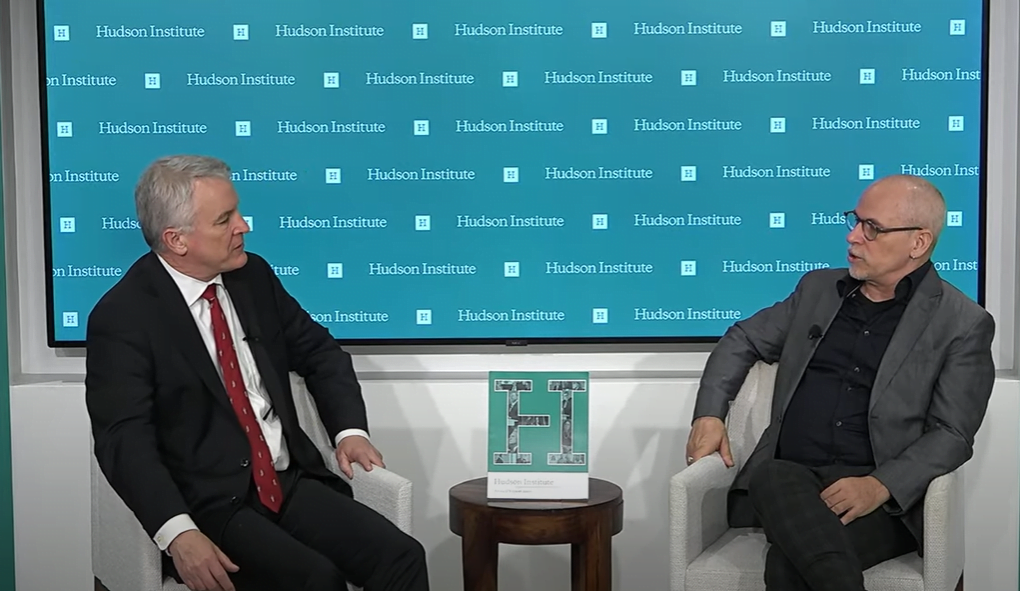
Doran and Taub’s Insight on The Tectonic Shifts of October 7th: Analyzing Its Impact on Israeli Politics and Society
The Hudson Institute in Washington D.C. convened a discussion featuring Dr. Gadi Taub, a renowned expert in Israeli politics, and Dr. Mike Doran, a distinguished Board Member of ACLS. This meeting focused on critical issues shaping Israeli political dynamics and their implications for regional stability and U.S. foreign policy interests. ACLS has provided a concise summary of the dialogue, alongside a video recording of the entire session, which includes Arabic subtitles for broader accessibility. This initiative underscores the importance of fostering greater understanding of complex geopolitical challenges in the Middle East among policymakers and scholars.
Introduction to Israel’s Political Identity and October 7th’s Impact
The intricate dance of politics and identity in Israel is a narrative deeply entwined with the fabric of its society, reflecting a complex interplay of historical trauma, national ideology, and the relentless pursuit of self-determination. At the heart of this narrative is a poignant reflection on the events of October 7th, a date that has emerged as a pivotal moment in Israeli politics, its impact still reverberating through the corridors of power and the streets of the nation.
Doran and Taub: A Dialogue on Ideological Fluidity
The dialogue between Dr. Mike Doran, a senior fellow at the Hudson Institute, and Dr. Gadi Taub, a professor and intellectual, unravels this complexity with a candid exploration of the shifting sands of Israeli identity and politics. Taub, once a left-wing intellectual who transitioned to the right, embodies the fluidity of political thought in Israel, where ideologies are often challenged by the harsh realities of geopolitical strife and internal divisions.
Reevaluating Zionism After October 7th
The aftermath of October 7th serves as a stark reminder of the vulnerabilities that Israel faces, not just from external threats but also from within its own ideological spectrum. This event, characterized by Taub as a moment that shook the very tectonic plates of Israeli society, has forced a reevaluation of what Zionism means in the 21st century. It challenges the notion of safety and security in a land that was meant to be a haven for Jews, pushing the discourse beyond the simplistic binaries of left versus right to address the fundamental question of survival in a region fraught with conflict.
The Ideological Battle: From Socialism to Survival
Taub’s analysis, enriched by historical references and personal anecdotes, illuminates the ideological struggle between the dream of a socialist Zionism and the reality of a nation that must continually defend its right to exist. This struggle is further complicated by the internal divisions that October 7th has exacerbated, revealing deep fissures within Israeli society that go beyond political affiliations to touch the core of Zionist identity.
Israel and the Diaspora: A Growing Divide
The conversation also delves into the broader implications of these events for Israel’s relationship with the diaspora, highlighting a growing divide between different Jewish communities around the world. Taub’s encounters in America, where he engages with Jewish communities, reveal a tension between the ideals of liberal Judaism in the diaspora and the existential realities that Israel faces. This tension underscores the need for a nuanced understanding of Zionism, one that recognizes the diversity of perspectives within the Jewish world while also acknowledging the unique challenges that Israel must navigate.
Conclusion: Reflecting on Israel’s Enduring Spirit and Future Challenges
In conclusion, the dialogue between Doran and Taub offers a compelling lens through which to view the complexities of Israeli politics and identity. It reflects a society in flux, wrestling with its past, present, and future, as it strives to reconcile the ideals of Zionism with the practicalities of statehood in a volatile region. The narrative that emerges is one of resilience and introspection, a testament to the enduring spirit of a nation that continues to seek its place in the world amidst the ceaseless tide of history.
=======================
📌 Incase you missed it,
📰 Iran’s Imminent Game: Steering Assad Toward an Inevitable Clash with Israel
📰 The Early Phoenix Feb 8, 2024
🔗 Follow the latest news from the American Center for Levant Studies via Google News


